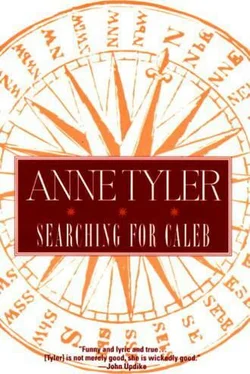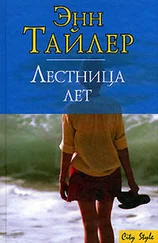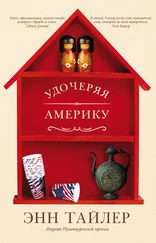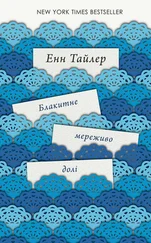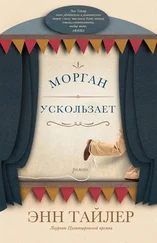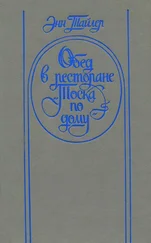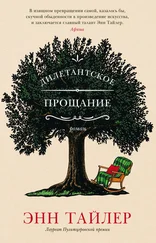When Justin Peck was fifty years old, he bought a sycamore-shaded lot in what was then the northern part of town. He built a gaunt house bristling with chimneys and lined with dark, oily wood. He filled it with golden oak furniture and Oriental screens, chandeliers dripping crystal, wine velvet loveseats with buttons up and down their backs, heavy paintings leaning out from the walls, curlicued urns, doilies, statuary, bric-a-brac, great globular lamps centered on tasseled scarves, and Persian rugs laid catty-corner and overlapping. Then he married Sarah Cantleigh, the sixteen-year-old daughter of another importer. Nothing is known of their courtship, if there was one, but her wedding portrait still looms in a Baltimore dining room: a child-faced girl with a look of reluctance, of hanging back, which is accentuated by the dress style of the day with its backward-swept lines and the flounce at the rear of the skirt.
In 1880, only nine months after the wedding, Sarah Cantleigh died giving birth to Daniel. In 1881 Justin Peck remarried, this time into stronger stock — a German cutler’s daughter named Laura Baum, who rescued Daniel from the old freedwoman who had been tending him. Laura Baum’s portrait was never painted, but she lived long enough to be known personally even by Meg, her great-great-step-grandchild. She was a shallow, straight-backed woman who wore her hair in a knot. Although she was twenty when she married, observers said she looked more like forty. But then she looked forty when she died, too, at the age of ninety-seven. And it was clear that she made an excellent mother for little Daniel. She taught him to read and cipher when he was only three years old, and she made certain that his manners were impeccable. When Justin suggested that she stop taking Daniel with her on visits to her father she agreed instantly, even ceasing her own visits although Justin had not asked that of her in so many words. (Her father was very obviously a foreigner, an undignified little man given to practical jokes. His dusty jumbled shop by the harbor was a hangout for seamen and other rough types.) “Always remember, Daniel,” she said, straightening his collar, “that you must live up to your family’s name.” She never explained what she meant by that. Her darkies broke into hissing laughter on the kitchen stairs and asked each other in whispers, “What family? What name? Peck? ” but she never heard them.
In 1885, Laura had a son of her own. They called him Caleb. He was blond like his half-brother, but his tilted brown eyes must have snuck in from the Baum side of the family, and he had his Grandpa Baum’s delight in noise and crowds. Even as a baby, being wheeled along in his caramel-colored wicker carriage, he would go into fits of glee at the sight of passing strangers. He liked anything musical — church bells, hurdy-gurdies, the chants of the street vendors selling hot crabcakes. When he was a little older he took to the streets himself, riding an iron velocipede with a carpeted seat. He and Daniel were confined to the sidewalk in front of their house, but while Daniel obeyed instructions, leafing through The Youth’s Companion on the front steps with his chick-yellow head bent low, Caleb would sooner or later be tugged southward by the fire bell or the gathering of a crowd or, of course, the sound of a street musician. He followed the blind harpist and the banjoist, the walking piano that cranked out Italian tunes, and the lady who sang “The Pardon Came Too Late.” Then someone would think to ask, “Where’s Caleb?” His mother came out on the front steps, a fan of creases rising up between her eyebrows. “Daniel, have you seen Caleb?” And search parties would have to be sent down all the streets running toward the harbor. Only everybody soon learned: if you wanted to find Caleb, hold still a minute and listen. Whenever you heard distant music somewhere in the town, maybe so faint you thought you imagined it, so thin you blamed the whistling of the streetcar wires, then you could track the sound down and find Caleb straddling his little velocipede, speechless with joy, his appleseed eyes dancing. The maid would touch his sleeve, or Daniel would take his hand, or Laura would grab him by the earlobe, muttering, “ This is where I find you! Out with a bunch of . . . well, I don’t know what your father is going to say. I don’t know what he’s going to think of you for this.”
Only she never told his father. Perhaps she thought that she would be held to blame. Sometimes, from the way she acted, you would think she was afraid of Justin.
On Sundays the Pecks went to church, of course, and on Wednesday evenings Laura had her Ladies’ Circle. On holidays there were the formal visitors: Justin’s business associates and their wives, along with their starched, ruffled children. But you couldn’t say that the Pecks had friends , exactly. They kept to themselves. They were suspicious of outsiders. After guests left, the family often remarked on the gentlemen’s inferior brand of cigars, the children’s poor manners, the wives’ regrettable overuse of Pompeiian Bloom rouge. Daniel listened, memorizing their words. Caleb hung out the window to hear an Irish tenor sing “Just a Lock of Hair for Mother.”
Daniel was a tall, cool, reflective boy, and from the beginning he planned to study law. Therefore Caleb would take over the importing business. In preparation for this Caleb attended the Salter Academy, walking there daily with his friend Paul and a few of the neighborhood boys. He worked very conscientiously, although sometimes his mother suspected that his heart wasn’t in it. Coming home from school he could be waylaid by any passing stranger, he fell willingly into conversation with all sorts of riffraff. He had no discrimination. And he still followed organ grinders. With his pocket money he bought tawdry musical instruments, everything from pennywhistles to a cheap violin sold him by a sailor; he could make music out of anything. He played these instruments not only in his room but outdoors as well, if he wasn’t caught and stopped. More than once he was mistakenly showered with coins from someone’s window. When Laura heard about it she would grow dark in the face and order him to remember his name. She shut him in the parlor, where he continued to spill out his reckless, made-up tunes on the massive piano draped in fringed silk. Unfortunately the Creole gardener, Lafleur Boudrault, had taught him ragtime. A disreputable, colored kind of music. Justin, home in his study doing the accounts, would raise his head to listen for a minute and frown, but then he shrugged it off.
In 1903, Caleb graduated from the Salter Academy. The day after his graduation Justin took him down to his office to show him around. By now, of course, the importing business was very different from what it had been in the ’70’s. The old fullrigged steamers, which looked like brigantines with smokestacks, had given way to modern ships, and their spectacular journeys to Brazil and Peru and the West Indies had been discontinued in favor of the more profitable coastwise hauls, carrying manufactured goods south and raw materials north. The Merchants’ Exchange had been torn down; Caleb would be spending his days in an office above a warehouse, behind a roll-top desk, dealing with ledgers and receipts and bills of lading. Still, it was a fine opportunity for a young man with ambition, Caleb. Caleb?
Caleb turned from the single, sooty window, through which he had been gazing even though it was impossible to see the harbor from there. He said that he would prefer to be a musician.
At first Justin couldn’t take it in. He was politely interested. Musician? Whatever for?
Then the situation hit him in the face and he gasped and caved in. He felt for the chair behind him and sat down, preparing bitter, harmful words that would convey all his horror and disgust and contempt. But music was so — no young man would ever seriously — music was for women! For parlors! He felt nauseated by the sight of this boy’s intense brown eyes. He could hardly wait to chew him up and spit him out and stamp on what was left.
Читать дальше
